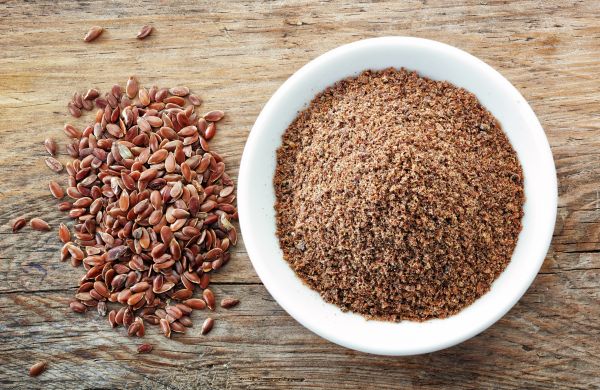Flaxseeds as Superfood
 Blue flax flower
Blue flax flowerFlaxseeds are the small, brown seeds of the flax plant. Flax, also known as linseed, is one of the oldest crops in the world and was mostly used for textiles in the past. In Ancient Greece, flaxseeds as well as flaxseed oil were known as remedies for many different illnesses and troubles. Today, flaxseeds have gained new fame as a superfood and are often used as ingredient for bread or muesli. At Ölmühle Solling, we started producing our freshly milled flaxseed oil already back in 1996. With around 50 g of alpha-linolenic acid per 100 g, it is one of the vegetable oils with the highest amount of this omega-3 fatty acid.
Flaxseeds: Rich in omega-3 fatty acids
The most outstanding feature of flaxseeds is their high content of alpha-linolenic acid, an essential omega-3 fatty acid. The small seeds have a brown shell and contain around 40 g fat per 100 g as well as 20 g of fibres and proteins respectively.
In the course of the last century, dietary habits in the Western countries have changed. The initial 3:1 ratio of omega-6 to omega-3 fatty acids in our food has shifted to nearly 20:1 nowadays. The causes for that are, among others, regular consumption of ready meals, fast food and an unbalanced diet. The food industry mainly uses refined edible oils and fat for food processing. For instance, margarine mainly consits of hydrated fats (e.g. made from sunflower oil) which leads to an increase of omega-6 fatty acids in the organism in the long term.
The balance between the two groups of fatty acids plays an important role in the functioning and the metabolism of human cells. While omega-6 fatty acids can promote inflammation, omega-3 fatty acids have anti-inflammatory effects. Both substances are needed for good health but the right ratio is crucial. Flaxseeds as well as flaxseed oil are suitable to restore the balance between omega-6 and omega-3 fatty acids.
Water-soluble fibres
Another extraordinary characteristic of flaxseeds is the large amount of water-soluble fibres they contain, namely around 20 g per 100 g. The shell of the small, brown seeds is extremely swellable and gelling which makes food easier to digest. Due to it's high absorption of fluids, it is vital that you increase your water intake accordingly.
Flaxseeds as a whole or ground?
Flaxseeds can be used unprocessed or ground. Because of their rather hard shell, it is often recommended to grind the flaxseeds which makes the valuble nutrients more accessible for the human organism. At the same time, the hard shell serves as protection for the sensitive fatty acids: The oxidation process starts as soon as the flaxseeds are ground or cold-pressed and the product may become rancid very quickly.
Flaxseeds can also be milled to flour. At Ölmühle Solling, we gently mill partly deoiled flaxseeds to fine flaxseed flour, that is suitable for baking or for mueslis.
Generally, all flaxseed products (oil as well as ground products) should be kept in the fridge after opening and should be consumed within 8 to 10 weeks. Also make sure that the packaging is closed properly to protect the product from oxygen.
 Flaxseeds unprocessed and ground
Flaxseeds unprocessed and ground




